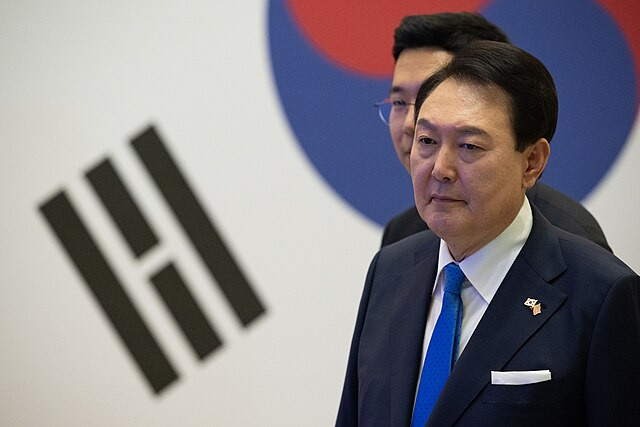In a significant reshuffle, South Korean President Yoon Suk-yeol's government has replaced six ministers, involving key departments such as finance, agriculture, land infrastructure, small and medium enterprises, maritime, and veterans affairs.
The Chief of the Presidential Office, Kim Dae-ki, announced at a press conference that Choi Sang-mok, the former chief secretary for economic affairs, has been appointed as the new finance minister and will also serve as deputy prime minister, succeeding Choo Kyung-ho. Oh Young-ju, a seasoned politician who has been serving as the second deputy prime minister, has been appointed as the minister for small and medium enterprises. Park Sang-woo, a former head of a state-owned real estate developer, will take over as the minister for land, infrastructure, and transport. The agriculture minister role will be filled by Song Mi-ryung, a former senior researcher at the Korea Rural Economic Institute.
These nominations are subject to confirmation hearings in the National Assembly, with specific dates yet to be announced. However, even if the nominations are rejected, President Yoon has the authority to approve the appointments.
This cabinet reshuffle was widely anticipated. With the parliamentary elections scheduled for April next year, the Yoon government is paving the way for this crucial electoral contest.
Currently, Yoon's ruling People Power Party controls only 37% of the 298-member National Assembly, while the main opposition party holds 56% of the seats. The upcoming elections will determine whether Yoon can escape the "lame-duck president" situation and smoothly advance his policies for the remaining three years of his term.
One strategy Yoon is employing is to promote well-known ministers to run for election, hoping to secure key districts through their high profile.
The most notable among them is the outgoing finance minister, Choo Kyung-ho, who, according to the Korean news agency, is likely to run for a seat in the Daegu region, a conservative stronghold in southeastern South Korea and his birthplace.
Political analyst Hwang Tae-soon, a former advisor to senior South Korean lawmakers, believes that the justice and foreign ministers may also follow this path, leaving the cabinet to run for election.
Recent media leaks in South Korea suggest that several outgoing ministers have plans to run for election. According to regulations, local officials running for election must resign at least 60 days in advance. More cabinet reshuffles are expected in the coming weeks.
Additionally, Yoon is seeking to gain support from female voters, reflected in the current reshuffle. Half of the six newly nominated ministers are women. Yoon's cabinet had previously been criticized for a lack of female representation. In last year's presidential election exit polls, most young female voters supported Yoon's opponent.
Despite the current cabinet changes mainly occurring in economic affairs departments, analysts do not expect this to signify a shift in South Korea's economic policy.
Economist Park Sang-hyun from HI Investment & Securities, citing the new finance minister's selection as an example, noted that Choi Sang-mook, as a long-time economic secretary, has been one of the main drivers of Yoon's economic policy. His appointment as the new finance minister is seen as a safe choice to maintain policy continuity.
The 60-year-old Choi Sang-mook is a career official in the financial sector. He served as deputy minister of finance during the Park Geun-hye administration and was in charge of the economic department of Yoon's presidential transition committee.
In announcing his nomination, the Chief of the Presidential Office, Kim Dae-ki, highlighted Choi's experience, describing him as a "top expert with deep understanding and insight into the overall economy, including macrofinance." As the new finance minister, he will focus on issues such as inflation and employment, addressing ongoing livelihood problems, and fundamentally improving the economic structure.
Yoon's approval ratings among South Koreans have been consistently low, hovering around 30% in recent months. According to data from Gallup Korea last Friday, Yoon's approval rating has declined for the third consecutive week, from 36% in the second week to 32% in the last week of November. Many respondents expressed dissatisfaction with rising living costs and Yoon's economic governance.
Domestic economic issues have been a major challenge for Yoon. In October, South Korea's inflation accelerated for the third consecutive month to 3.8%, far exceeding the central bank's target of 2%. High-interest rates have also led to increased borrowing costs, weakening private consumption and adding pressure on households with rising debt levels.
The latest blow to Yoon's popularity was the defeat in the bid to host the 2030 World Expo. On November 29, South Korea's Busan lost to Saudi Arabia's Riyadh by a vote of 29-119 in the bid for the 2030 World Expo. This sparked criticism among South Korean citizens, and a few hours later, Yoon apologized in a national address, expressing disappointment with the result despite concerted efforts by the public and private sectors and his personal meetings with leaders of 96 countries. He took full responsibility for the outcome.
Yoon's cabinet reshuffle began last week. He created a new position, Chief of the Presidential Policy Office, and replaced all five senior secretaries. Other personnel changes included the appointment of Park Chunsup, a former member of the Bank of Korea's board of directors, as the minister for economic affairs.
A statement from the South Korean Presidential Office on Thursday evening said the new appointments are committed to improving the lives of South Koreans but did not specify how policies would change.





